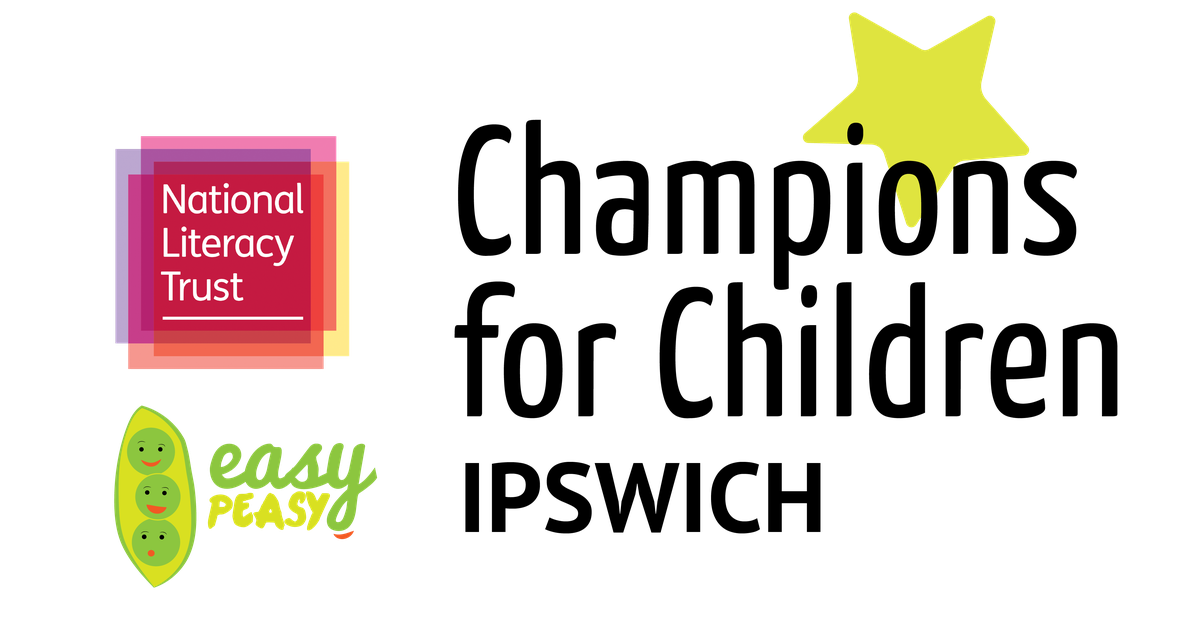Bringing settings together across a geographic area to share their experiences.
#580
Champions for Children
Training for Early Years practitioners across Ipswich from the National Literacy Trust, developing their expertise in supporting children and families with early language development. This allowed us to help children in the Early Years Foundation Stage to develop the emotional, social and communication skills they need to improve their life chances.
Audience
Head Teachers / School Leaders, Local Authorities, Settings & Early Years Practitioners, TrustsAimed at
Early Years Foundation StageOutcome
Early Years, Language Development, Literacy, School ReadinessWhy was the project needed?
Encouragingly, the percentage of children achieving a good level of development at the end of the Early Years Foundation Stage in Ipswich at the start of the Opportunity Area was in line with national average. However, the data showed that children from disadvantaged backgrounds consistently achieved lower levels of development than their non-disadvantaged peers. Disadvantaged children in Ipswich were also less likely to achieve an exceeded level in many of the individual Early Learning Goals (ELGs).
School leaders reported that not all children began school having developed the behaviours, such as agency, resilience and self-regulation, they need to learn and fulfil their potential.
What happened and what was the impact?
The National Literacy Trust delivered training to 116 early years professionals, now called Child Development Champions, from 66 nurseries in Opportunity Area. The training focused predominately on proven techniques to support children’s language development and on strategies to support parents to continue their child’s learning at home.
Practitioners took part in eight hours of face-to-face training, which included:
Stages of language and social and emotional development for typically developing two- to five-year-olds
Communication and social and emotional difficulties in the early years and risk factors to consider
Strategies for identifying communication and language delay
Strategies for improving speech, language and emotional development through high quality adult-child interactions
Specifically, through the HELLO+ improvement framework, practitioners learnt:
- How to support parents to improve their home learning environment through family activity sessions and signposting to resources
- How to create an enabling classroom environment for speech, language and social emotional development
- How to observe, track, support and monitor children’s development along with their parents
The training days were followed by support to complete the HELLO audit and create an action plan linked to the audit. Individual support was provided by Specialist Leaders of Education (SLE’s) who are employed by Highfields Nursery. Following training, practitioners were invited to a series of seminars and network events and invited to submit a case study.
What did and didn't work?
The very comprehensive course content suited many settings, but some smaller settings asked for support with what was sometimes seen as an overwhelming programme.
If the programme was repeated, the opportunity for settings to network and practitioners to “buddy up” would be beneficial. SLE support was found to be effective alongside the programme, as was the availability of adult literacy support for practitioners where requested.
How did you measure success?
After taking part in the project, practitioners told us that they:
- Have greater knowledge and skills to support children’s communication, social and emotional development.
- Are more likely to introduce changes to the nursery environment to stimulate chat and play.
- Are more likely to engage and involve parents in activities to support their child’s language and communication development at home.
- All shared their learnings with other early years workers in their setting and will continue to do so.
You can read a more detailed evaluation of the programme in the resource section below.

Wisdom
Ingredients For Success
Estimated Costs
The project cost £98,000 to implement across the Opportunity Area.
Area Most Impacted
Speech Language & communication
Next steps to do something similar yourself
These are a list of Big Idea resources that you can use to implement in your setting:
Read the National Literacy Trust evaluation of the Champions for Children programme in Ipswich schools.
Read the EEF Guidance Report on Preparing for Literacy here
Read the EEF Guidance Report on Metacognition and Self-Regulated Learning here

If you've got any thoughts and ideas of how this approach could be improved or an positive impact it's had for you, add them below
Login or register now to post any comments